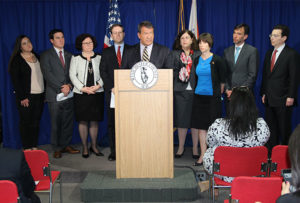Westchester officials recommend Con Ed, NYSEG rethink reliance on mutual aid, robocalls

A panel of Westchester elected officials says the county”™s two electric companies need to lessen their reliance on mutual aid workers following storms, better communicate with municipalities and abandon the use of robocalls to update customers on outages.
Those were just a few of the recommendations in a 41-page report released May 21 by United Westchester, a group of 70 elected officials co-chaired by Westchester County Executive George Latimer and New York State Assemblyman David Buchwald (D-White Plains). The group was formed to examine the performance of Consolidated Edison Inc. and NYSEG following two nor”™easters in early March that knocked out power to more than 150,000 customers.
In the days following the storm, Latimer called for resignations from top executives at both companies, frustrated with what he called “failure on the streets of this county” in restoring power and communicating with customers.
His stance included a video posted by the county of Latimer angrily dressing down Con Edison officials in a March 7 conference call, which he referenced in a press conference Monday announcing the report.
“You saw the more-than-famous video, friends who haven”™t seen me in thirty years saw it on TV, when I was upset about what I saw at the time, what I thought was inadequate response,” Latimer said. “But the overall gist of this report and of the response by elected officials ”¦ is not anger as much as it is anger that leads to action. We need to see change.”
[vsw id=”S3xjddBSoBc” source=”youtube” width=”650″ height=”440″ autoplay=”no”]The 70 elected officials participating in United Westchester ”“ ranging from mayors and supervisors to congressional representatives ”“ first met toward the end of March.
The group distributed surveys to more than 30 municipal leaders that covered 21 separate topics related to storm response. This report summarizes the issues raised in survey responses.
The report took particular aim at the use of mutual aid utility employees called in from outside the region to help restoration efforts following major storms. Comments from officials compiled in the report praised the efforts of utility workers, but said both companies appeared understaffed. Mutual aid workers were not called for quickly enough, the report said, with crews sometimes requiring days to arrive once called.
In instances of regional storms, the report noted, customers are left waiting for mutual aid workers to come from the Midwest, Canada and the South.
“The whole process has to be evaluated,” Latimer said at the press conference. “How much are we relying on mutual aid to handle what amounts to be frequent instances, not the once-in-a-blue-moon instance we theorize is a process of this?”
The report also questioned whether Con Edison and NYSEG had properly forecasted the storm and if either utility had been prepared for its worst possible damages. United Westchester recommended the state”™s Public Service Commission, Con Edison and NYSEG perform an analysis of their ability to forecast storm severity and how they prepare for those storms.
Elected officials in each municipality also had complaints about the way utilities provided updates. The report recommended that both utilities invite municipal leaders to participate in pre-storm conference calls. It also said Con Edison and NYSEG need to keep updated contact information on all elected officials, organize calls by sub-region rather than municipality and make sure utility employees are prepared to answer questions.
The report also criticized customer robocalls, which it said often did more harm than good by spreading misinformation. That’s a problem Con Edison has acknowledged. The company filed its own report last week with the state examining its storm response. Con Edison acknowledged communications failures with customers, which it said were caused in part by predictive software meant to estimate outages that customers do not report. The system, according to Con Edison’s report, over-estimated outages in some areas and provided inaccurate restoration estimates in others.
United Westchester officials would like both companies to consider breaking away with robocalls altogether.
“We found those calls were almost always inaccurate, they were general in nature, they did not accurately reflect what was happening on the ground,” Latimer said. “We understand there”™s technology where you can mass-communicate, and it may in fact be that that type of mass communication is disinformation if it”™s not accurate information.”
Other recommendations in the report include that utilities provide liaisons to municipalities at the start of storm restoration work; that both companies initiate a dialogue about how to better help vulnerable customers; and that Con Edison and NYSEG engage municipalities to update their list of facilities that require immediate attention following outages.
View the full report here: